Contents
- 1 Look Back in Anger (1959)
- 2 Room at the Top (1959)
- 3 Saturday Night and Sunday Morning (1960)
- 4 A Taste of Honey (1961)
- 5 The L-Shaped Room (1962)
- 6 The Loneliness of the Long Distance Runner (1962)
- 7 This Sporting Life (1963)
- 8 The Leather Boys (1964)
- 9 Alfie (1966)
- 10 Georgy Girl (1966)
- 11 The Family Way (1966)
- 12 Poor Cow (1967)
- 13 Up the Junction (1968)
- 14 Spring and Port Wine (1970)
- 15 Kitchen Sink Dramas @Wikipedia
Last updated on the 20 June 2025 by Maeve
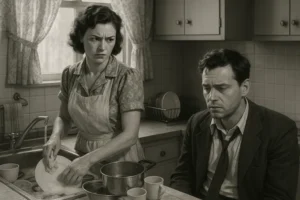
Kitchen sink dramas (aka British New Wave) are a genre of films and plays from the 1950s and 1960s that depict realistic stories of working-class life, focusing on domestic settings and exploring themes of social inequality, family dynamics and personal struggles.
Look Back in Anger (1959)
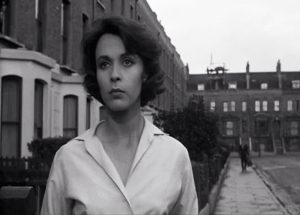
Bftv 8.5 / IMDb 7.0
Set in a cramped British flat, a disillusioned intellectual relentlessly torments his wife and their friend, an act that lays bare the frustrations and anxieties of a generation adrift. Their volatile relationships, fuelled by class resentment and personal bitterness, unravel amidst a backdrop of post-war disillusionment, ultimately leaving a trail of emotional devastation.
Top cast: Richard Burton, Mary Ure, Claire Bloom, Gary Raymond, Edith Evans, Glen Byam Shaw and Donald Pleasence.
Room at the Top (1959)

Bftv 9.0 / IMDb 7.5
An ambitious young man from a working-class town in northern England schemes his way up the social ladder. He juggles two relationships, one with a wealthy heiress and another with an older, married woman. His ruthless pursuit of status leads to heartbreaking consequences, forcing him to confront the true cost of his aspirations.
Top cast: Laurence Harvey, Simone Signoret, Heather Sears, Donald Wolfit, Hermione Baddeley, Donald Houston, Allan Cuthbertson and Raymond Huntley.
Saturday Night and Sunday Morning (1960)
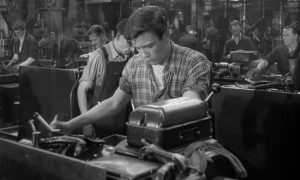
Bftv 9.0 / IMDb 7.5
In a Nottingham factory, a rebellious young machinist chafes against his mundane life. He works hard and plays harder, engaging in a reckless affair with a married woman while also dating a younger, more innocent girl. His defiant pursuit of pleasure and independence clashes with societal expectations, leading to inevitable complications and a pivotal decision about his future.
Top cast: Albert Finney, Shirley Anne Field, Rachel Roberts, Hylda Baker, Norman Rossington, Bryan Pringle and Robert Cawdron.
A Taste of Honey (1961)
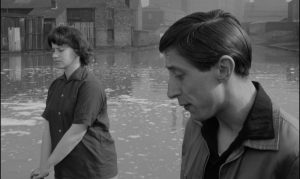
Bftv 9.0 / IMDb 7.4
A spirited but lonely teenager in a working-class northern town suffers a difficult relationship with her flamboyant, neglectful mother. After a brief affair with a Black sailor leaves her pregnant, she finds an unlikely home and companionship with a compassionate gay friend, creating an unconventional family unit.
Top cast: Rita Tushingham, Dora Bryan, Robert Stephens, Murray Melvin, Paul Danquah, David Oliver and Margo Cunningham.
The L-Shaped Room (1962)
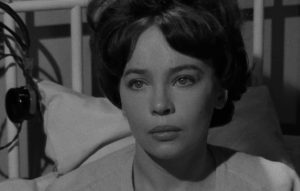
Bftv 8.5 / IMDb 7.3
A young, pregnant French woman seeks refuge in a rundown London boarding house, avoiding the stigma of being unmarried. Amidst a motley crew of eccentric residents, including a struggling writer and an ageing actress, she grapples with loneliness, societal judgment and a blossoming romance. The film explores themes of acceptance, unconventional family and finding solace amidst challenging circumstances.
Top cast: Leslie Caron, Tom Bell, Brock Peters, Cicely Courtneidge, Bernard Lee, Patricia Phoenix and Emlyn Williams.
The Loneliness of the Long Distance Runner (1962)
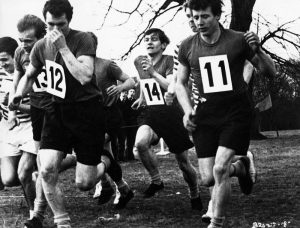
Bftv 9.0 / IMDb 7.5
A rebellious teen from a bleak reform school discovers unexpected freedom through long-distance running. As he reflects on his troubled past, the solitude of the track becomes a battleground for defiance and self-realisation. Faced with a moral dilemma, he must choose between personal integrity and institutional expectations.
Top cast: Tom Courtenay, Michael Redgrave, Avis Bunnage, Alec McCowen, James Bolam, Joe Robinson and Dervis Ward.
This Sporting Life (1963)

Bftv 9.0 / IMDb 7.5
A rugged coal miner turns to professional rugby as an escape from his harsh reality, embracing its brutality and glory. As fame grows, so do his inner demons and volatile relationships. Struggling with emotional vulnerability and isolation, he confronts the emptiness behind his tough exterior and fleeting success.
Top cast: Richard Harris, Rachel Roberts, Alan Badel, William Hartnell, Colin Blakely, Vanda Godsell and Anne Cunningham.
The Leather Boys (1964)

Bftv 9.0 / IMDb 7.1
“The Leather Boys” portrays the story of Reggie and Dot, a young couple who get married but face challenges as their interests and desires begin to diverge. Set against the backdrop of the 1960s biker subculture, it explores themes of identity, love and societal expectations. Of all the kitchen sink dramas this one is considered by many to be an invaluable contribution to the legacy of queer cinema.
Top cast: Rita Tushingham, Colin Campbell, Dudley Sutton, Gladys Henson, Avice Landone, Betty Marsden and Michael Robbins.
Alfie (1966)
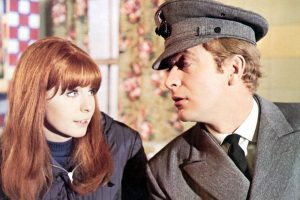
Bftv 8.5 / IMDb 7.0
A charming Londoner breezes through life romancing women with wit and detachment, avoiding commitment at all costs. But as carefree conquests lead to unexpected consequences, he’s forced to confront the emotional fallout of his choices. Behind the swagger, he begins to question what truly matters in life and love.
Top cast: Michael Caine, Shelley Winters, Millicent Martin, Julia Foster, Jane Asher, Shirley Anne Field and Vivien Merchant.
Georgy Girl (1966)

Bftv 8.5 / IMDb 6.9
A lively and unconventional young woman negotiates swinging London with wit and awkward charm, caught between a glamorous roommate, a selfish lover and the prospect of stability. Torn between independence and longing for connection, she confronts the expectations of femininity, romance and self-worth in a world changing as fast as she is.
Top cast: Lynn Redgrave, James Mason, Alan Bates, Charlotte Rampling, Bill Owen, Clare Kelly, Denise Coffey and Peggy Thorpe-Bates.
The Family Way (1966)
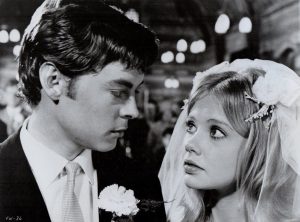
Bftv 8.5 / IMDb 7.3
Set in Northern England, two young newlyweds face an unexpected challenge: their new home lacks privacy, forcing them to remain with his boisterous family. The close quarters and constant intrusion from well-meaning relatives put a strain on their nascent intimacy, leading to a comedic yet poignant exploration of love, family ties and the struggle for personal space in a crowded world.
Top cast: Hayley Mills, Hywel Bennett, John Mills, Marjorie Rhodes, Avril Angers, Murray Head, Barry Foster and Wilfrid Hyde-White.
Poor Cow (1967)

Bftv 8.5 / IMDb 6.8
A young working-class woman lives a difficult life in London, marked by poverty and unstable relationships. As her husband serves time in prison, she finds fleeting comfort with another man, also a thief. Constantly yearning for a better future for herself and her son, she experiences repeated disappointments, but her resilient spirit remains, albeit amidst a backdrop of grim reality.
Top cast: Carol White, Terence Stamp, John Bindon, Queenie Watts, Kate Williams, Bill Dean and Michael Bangerter.
Up the Junction (1968)
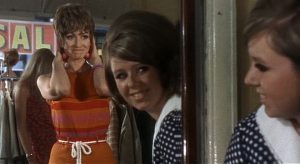
Bftv 8.5 / IMDb 6.9
A bored heiress abandons her privileged life in Chelsea to experience the gritty reality of working-class Battersea. She takes a factory job and befriends two sisters, witnessing the struggles of poverty, unwanted pregnancies and limited choices. Her immersion in this new world and a relationship with a local man, exposes the stark differences in their lives and dreams, leading to a poignant clash of aspirations.
Top cast: Suzy Kendall, Dennis Waterman, Maureen Lipman, Adrienne Posta, Michael Gothard, Liz Fraser, Susan George and Alfie Bass.
Spring and Port Wine (1970)
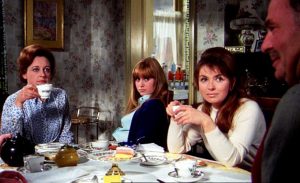
Bftv 8.5 / IMDb 7.0
In a working-class English household, a stern father’s grip on family values is tested when his children begin challenging his rules. As generational tensions simmer, a simple dispute over a meal sparks emotional revelations, leading to moments of reconciliation, love and a quiet shift in the family’s dynamic.
Top cast: James Mason, Diana Coupland, Hannah Gordon, Susan George, Rodney Bewes, Len Jones, Keith Buckley and Avril Elgar.
